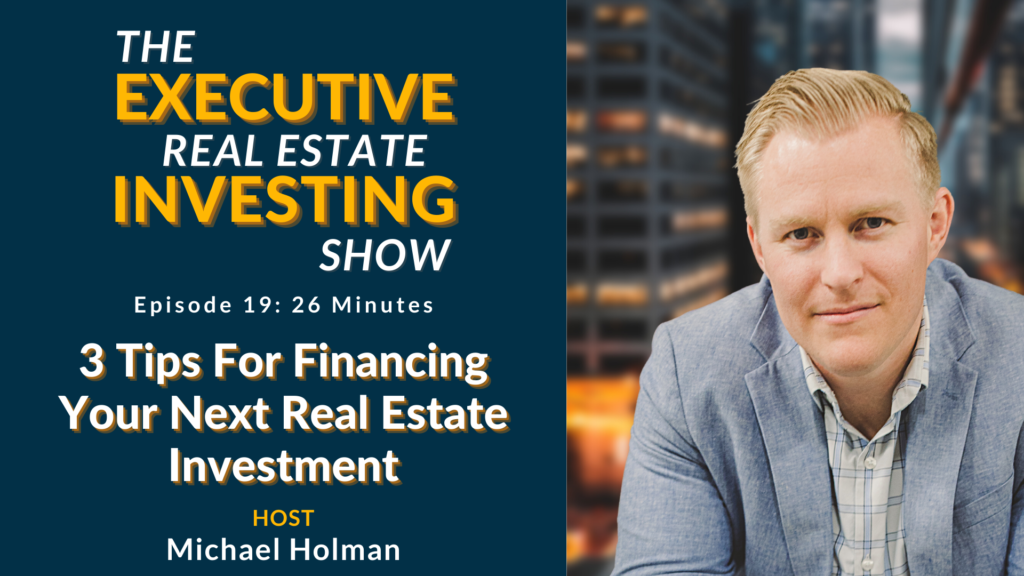
The executive Real estate investing Show
EPISODE 19
3 Tips For Financing Your Next Real Estate Investment with Michael Holman
- October 11, 2021
EPISODE SUMMARY
It’s all about financing in this episode of The Executive REI Show, in which host Michael Holman offers up 3 Tips for Financing Your Next Real Estate Investment. Whether you’re looking for a $500k or $50 million loan, these principles apply. With these tips, investors at all levels of experience can save time, money and frustration by following a clear roadmap to securing exactly the right lender for no matter what deal. Learn real, actionable strategies for reaching your real estate investment goals and creating either active or passive generational wealth.
EXECUTIVE TIP
Take Care of Your Health
LISTEN TO THE PODCAST HERE

The Executive Real Estate Investing Show Podcast
EP 19: 3 Tips For Financing Your Next Real Estate Investment wit Michael Holman
Listen on
READ THE TRANSCRIPT HERE
Note: Audio transcription has been automatically transcribed
Welcome to The Executive Real Estate Investing Show. This podcast is for you, the busy business owner or executive looking to create generational wealth. Here, we’re going to show you how to do that through real estate investing from multifamily to industrial and everything in between. You will become a real estate investing expert. And now, here’s your host, Michael Holman.
Welcome to another episode of The Executive Real Estate Investing Show. I’m your host, Michael Holman. Great to have you with me this week is going to be an exciting week. We’re going to talk about financing and all things financing. I’m actually going to give you three tips that I have right now if you were trying to finance a real estate investment deal.
But as always, we’re going to get started with today with our executive tip today’s executive tip, take care of your health. It is really, really hard to take care of the rest of the things going on in your life. If you are not taking care of your health, that’s something that you see.
We interview a lot of people. We’ve had a lot of coaches. Health is something that is always talked about, right? So, you got to make sure that you’re taking care of your body, taking care of yourself physically. I often heard people say what good is, having all the money in the world. If you’ve ruined your health in the process, you can’t even enjoy that money and do the things you know, with yourself, with your family that you want to do.
So today’s executive tip, take care of your health. Be physically active in whatever you have to do to make sure that you aren’t being healthy. Also, if you have not yet visited the website, I say time and time and time again, go visit the website, www.ExecutiveREIShow.com It’s a phenomenal place to go get information.
You can see all the episodes. If you want to ask an executive question, that is one of my favorite episodes that we do. We usually do it about once a month or once every other month. Love answering those questions. So, if you’ve got a question, go on, ask your question. If you’re interested in being a guest on the show, if you want to view all the other resources, lot of good stuff on there. www.ExecutiveREIShow.com.
Lastly, if you’ve been listening and you like what you hear, go ahead and hit subscribe on wherever you’re listening to your podcasts. Love to have you listening every single week. Get the tips, let’s take this investing to the next level, right? It’s one thing to just dabble in it.
It’s another thing to start to really understand. And that’s one of the things we try and do with this show is we’re trying to give you real actionable items and bring in people who have been there and that can help show you the path that you need to take in order to become a great real estate investor, whether that’s passively or actively, today’s an exciting show.
The reason I say that as many of you know you know, I’m a CPA by trade, got into development. That’s where I’m at, I love development. I love real estate development. That’s where my real estate investing activities lie at least a vast majority of them. And I do a lot with financing. I mean, that’s a huge piece of it.
Development is how do you finance a deal? How do you get one of those deals done and how do you get the money that you need? And so what do I want to talk about today is I want to give three tips that I have found over the last few years, and these are all the tips that I have, but these are three specifically you know, that I have found to be very valuable when you’re trying to finance your real estate investment.
And this is true whether you have, or you’re trying to close on $500,000 loan, or whether you’re trying to close on a $50 million loan, right. The principles that I’m about to tell you apply across the board. Right. And I mean, a lot of what we do is in, you know, closer to the 40, 50, $60 million range. But that being said, the principles here, like I said, are still gonna apply, whether you’re just trying to get into that first fourplex or whether you’re trying to build a 200-unit apartment complex storage unit flex space, wherever the case may be, these are gonna help.
So we are going to get right into some of these tips and we’re going to talk a lot about them and why I say them. So, tip number one, there is an honest to goodness value for flexibility. When it comes to financing, I’m going to say it again there is an, a true value. You could almost put a dollar amount on the value of flexibility.
And this is, this goes against the grain for a lot of people. The reason I say that is sometimes your cheapest lenders, aren’t flexible. And depending on your situation, that could actually cost you end up costing you a lot more to try and go with the cheap lender than to go with the flexible lender or the lender that works for you in your circumstance.
I mean, one of the examples that come to my mind. We have a loan that, that we’ve just been closing. And we went with the cheapest, which was fine. The problem is, is they had a box, right? This is a very traditional lender, super conservative. They had a box and we had some funny stuff. We had not funny, but we had, I mean, this was a fairly complex transaction.
There was a lot going on. I mean, we have we have techs, we have preferred equity or mezzanine debt. I mean, we have a lot of kind of just stuff happening in here. And so we went with it, you know, going with the very cheapest lender. And what ended up happening is because they had this box that they lived in, right.
And it was a small box. They were just, they were just going through deals. They did everything. 20 layers of review and approval before anything could get done, you bring them a deal. That’s a little outside that box. I mean, if it’s fitting an inch outside that box, all of them go haywire, right?
And you find this a lot with lenders, right? Lenders, different lenders have different boxes. And if you can, you got to match up some, some have really big boxes. And are really flexible. And those lenders often charge more because they are flexible and because they do have big boxes, right. They can get things done.
Generally they’re more expensive, but every lender has a different box and you need to line up with your real estate investment with the lenders box. If you, if you were someone who’s just getting started, it’s probably pretty common to just think all the lenders have the same. I mean, you started looking at.
So like when you get a house, I mean, all the lenders seem to be within like half a percent. It’s not, you know, it’s not, I mean, it’s, there’s not like huge swings necessarily. There’s some that are like way out there, you know, that are maybe higher or lower, but those are, those are the exceptions to the rule.
That’s not the case, especially when you get into bigger commercial real estate. I mean, if you start getting into bigger deals, not all lenders are created. And what they do and how they do it and the pricing that they charged for that even lenders that might be really huge that you think, okay. I mean, they gotta be seeing deals all over the place.
There’s probably nothing they haven’t seen. You would be surprised. Sometimes the biggest lenders are the ones that are the least flexible. That happens a lot because you have, you’ll have somebody who prepares it, right. You’ll have a loan officer and then you’ll have a relationship manager and then you’ll have a peer review and then a credit review, and then you’ll have a loan committee.
And it’s like all of a sudden you have to get through a hundred people. Right? I mean, I look at it to two loans in stark contrast that this relates to I had one loan that we closed and it was with a big. But their flexibility was, was fantastic. They were a little bit more expensive, but this is somebody I can call up.
I call the president of the bank at any time, and I can have a conversation with him and I could explain, Hey, here’s what’s going on. And here’s why I’m doing what I’m doing. Here’s why this is structured. So, I just only had to reason with one person who was a very intelligent, very bright person.
And I knew if I got his buy-off everything else below him float through and I wouldn’t have any. Right. And I paid a little more for that loan, but it closed quickly. It was on time. You know, there was a lot of benefit, you know, I had minimal legal fees. If, if hardly any on this, I didn’t even have to hire an attorney except to review the loan documents, but I didn’t have to hire an attorney to talk with their attorney to get their (inaudible) I mean, straightforward now on the flip side, right.
I’m talking about, I’ve got this lender right now. You know, I’ve had this lender in the past. It was it has a very tight box and they were the cheapest we’re trying to go with them. Well, this is, it’s a very similar, almost exactly structured, almost exactly the same way as the loan that I just described.
And the difference there is that talking about value. I mean, I’ve probably spent a hundred and 50,000, you know, a hundred, $250,000. That’s had to be spent on legal fees, even just legal fees, just to get everybody on the same page, right? Because one little change outside the box and you also, and you have two or three attorneys that all have to get together.
They all have to come to a conclusion. They all have to make sense of it. And then they all have to go draft everything and then they have to come back and they have to do it again. And so that being said, you look at it, that’s all $150,000. Don’t get me wrong, you know, at the end of the day, that’s not the only thing going into it because the lower interest rate more than covers the $150,000.
So, you know, math if you were only looking at those two, you know, you’d still go with the cheaper lender potentially. Great, but that’s just one of the value points that come with flexibility. Now look at some of the other value points time. I was able to close in three months on a pretty complex transaction with that flexible lender.
Things went smoothly. And I think, yeah, honestly, I said three months it was September to December, but I think it was the end of September to the beginning of December. It was more like two months to be honest, not or two and a half. It’s not three months pretty good. And this is a big one. I mean, it was a $20 million loan.
Now this other lender, right, been at it for like six plus months and, and just trying to get everything together and the issues that you see is, is you just, there’s a value for flexibility. I’m not saying you have to go with an expensive lender every single time, but what you need to do is you need to evaluate your real estate investment.
Right? And you need to start asking yourself some questions. Is this in the box? Right? Is this for like a standard real estate trends? And if you don’t know, that’s where my tip number three is going to come in. But if you do know, then you need to take some time to think about this, right?
Is this a standard real estate transaction? And this is going to transition perfectly into what my second tip is. My second tip for financing real estate investment is do your homework upfront. Remember how I said every single lender is different. You need to do your homework up front to be able to try and avoid disasters down the road.
A lot of times you’re in this frenzy, right? You’re trying to get a deal done and you’re, you’re gathering up all the information and you’re getting these term sheets and you’re thinking this is going to be awful. And you’re looking at them and you’re looking, usually you look at them only quantitatively, right?
So once again, understand the flexibility you’re looking at content, or this person is going to achieve as this is the person we’re going with. Right. Well, half the time, you might not even know anything about that lender, right? I mean, there’s a lot of, there’s thousands of lenders out there. You have your banks, you have debt funds, you have life insurance companies, CMBS, you have agency. I mean, you have a lot of different types of lenders and a ton of lenders within each of those categories. It’s really common to do a deal with a lender you haven’t worked with before. Right? If you have not worked with a lender before, it is time to start asking around, I mean, think about the same thing when you’re hiring employee.
I mean, when you hire an employee, what is a good manager? All right. They’re going to come in. I’m going to call some references. I’m going to try. And, you know, even though I don’t know, I can’t know everything about this person before they come and work for me. I’m going to try and gather as much information as I can so that I can make the best decision possible with the information that I have, and I see too many people just rushing into it. Right. They don’t ask around, they don’t try and get references. They don’t want to get other people’s experience, you know? Hey, what kind of deal did you have a good experience? Well, what kind of deal did you, do? You know?
What did it look like? What was the structure? And people, people are oftentimes very willing to share these experiences with you. Cause a lot of times, if they’ve had a great experience, they’re going to tell you about that. They’ve had a terrible experience. They’re going to tell you about that. And so when you do your homework upfront, it avoids a lot of headache.
And what I was getting into as well is, I mean, what does that specific lender like to do if you’re listening to this thinking? Oh, well, you know, every lender, they just probably look at it. If it’s a good deal, they do it. If it’s not going to fail, they don’t do it wrong. That is not the case at all. A hundred percent wrong. These lenders have specific requirements. They have targets that they have to meet.
Oftentimes out of the, out of control, out of the control of anybody you’re talking to, right. You’re talking to a loan officer or a relationship manager. It might be that the bank’s board of directors determined that we don’t want to do any more.
Multifamily or hospitality or self-storage or whatever it is. And if you go trying to take one of those asset classes to that lender, it’s going to be like putting a square peg in a round hole. I mean, it is going to be impossible, and a good lender will tell you and be upfront with you. Hey, we’re not going to get this done just period.
But heaven forbid you get a not good lender. And, and all of a sudden you’re going down and you find out in the 11th hour. You know what we don’t, we’re not really doing any multi-family right now, our portfolio, our Mulitfamily bucket has been filled up and I decision way above me that I have no ability to change.
Isn’t going to change that. I just thought maybe I could tweak the deal. Right? These loan officers are incentivized to get deals done, finding a loan officer. You know, it’s, it’s like any profession, there’s really good ones. And there’s really bad ones. I mean, it’s, you can find that in any kind of line of work.
And it’s the same in the banking world, right? And the good loan officers, they will be very upfront with you. And they’ll tell you, these things are going on, right? You might get a new loan officer, someone who’s, you know, not as, not as reputable or something. And they’re trying to force this through the bank the whole time only to find the, the 11th hour.
You can’t even get done what you want to do, right? These are the problems that you need to be thinking about, right. Is you need to be able to do your homework upfront as much as you can. And I know you can’t get an analysis process, cause guess what? You’re never going to have a hundred percent of the information.
You’re never going to be 100% certain that this lending relationship is going to work or not. Okay. So there is a little bit of leap of faith, but the more of the work that you can do, the more of the research that you can do upfront is going to pay dividends. Right? Cause usually upfront you have multiple lenders.
If you only have one lender and that’s the only person that’s ever going to do your loan. Okay. I mean, that’s a whole other set of problems that we’re not going to get into right now, but generally on the front end, you’ll have 2, 3, 4, 5, 6 different lenders that are all interested in doing your deal, you know, at different rates, with different terms and you need to analyze those, right?
You need to look at those and do, if you’re thinking about going with somebody, don’t be afraid to get in there and start asking hard questions that lender wants your business, right? They would not be sending you a term sheet if they didn’t want your business. You got to understand that this is a two-way street.
A lot of times it’s, it feels like, you know like a lion, right? There’s a lot of developers that feel at the mercy of a lender. Right? And you, you do have to be your lenders, your partner, and you do have to treat them well, you’d be transparent, right? You have to treat them like a team player.
But that lender, if you did your research and they gave you two, you know, they usually will they want your business leads, loan officers, these banks, they have lending requirements that they have to hit. They’re trying to make money too. And for a bank, if their money is, or for a lender, if their money is sitting in a bank account, not deployed, they are probably losing money.
So they need that money to be out there. They needed to be deployed and you know, they’re not trying to lose any of it. And that’s why you have to go through the whole due diligence process with them. But they want that money to be.
So, the tip number two was do your homework upfront, do your due diligence, just like you do on any other aspect of the real estate investing process.
All right. Number three. And this is probably one of the most important ones, if not the most important one and that’s get help when, and if you need it. I see a lot of people going at it alone. Which is fine. You have to understand that there’s a lot of lenders out there. There’s a lot of complexity. They can go into these transactions and oftentimes you can pigeonhole yourself into a bad situation by going it alone.
I’m not saying you have to go out and find a broker who can help you with the capital. That’s not, you know, it’s not a requirement, but if, if you’re new, if you don’t understand what’s going on, or if you’re just trying to get a broader reach in the market, The way that a broker can help you is if that broker can bring you say the best you can.
Let’s just take an easy example, maybe the best loan you could get. You’re trying to get a $20 million construction on, right? You, you worked hard, you put it together. All the investors there, you’re working on getting it to a $20 million construction loan. You might get a 5% interest, or I don’t know, 6% we’ll call it 6% interest rate on a construction loan.
Well, there were likely lenders out there that you don’t even know about that you don’t even know they exist. It’s sometimes it can be very much worth it to pay a broker a little bit in points, right? Your, your standard brokers going to charge you usually around half a point, you know, so 0.5% of the total loan amount they’re going to tack on and their fee.
And that’s, you can use that as a standard rule for. Some will get really, really aggressive and they’ll, they’ll try and get to a point and a half. Honestly, the range has gotta be half a point to a point. Sometimes they’ll get a little bit bigger on smaller loans, but if you’re doing big loans in my recommendation, I wouldn’t pay more than a point.
And generally I pay a half a day. And usually that broker’s also getting paid by the lender. So, I can tell you that that broker isn’t going hungry. If you close on a loan with them, because they might be getting half a point from you, but they’re also getting a half a point from, from the lender. But that being said, the important thing here.
At the end of the day, that’s not a lot of money. If you’re getting a better loan, you’re getting something more flexible. You’re getting a better rate. You’re getting non-recourse you’re, you know, you’re getting something like that. If you are getting it, doesn’t take a lot. Right. But if you’re getting something that’s marginally better, right?
It doesn’t even have to be significant. A lot of times, if you’re getting something that’s marginally better, your cost of capital is cheaper. Using the broker, then not using the broker and not only just on the cost of capital, but also helping you understand what your options are, right? Like if you don’t know, if your deal is a standard real estate investment transaction, having an experienced broker come in, they can help, you know, and understand, hey, this is this isn’t, you know, this is really complex.
And your, your opportunities for lending are, you know, they’re going to be pretty low. This deal, just so you know, to get it done, it can get done, but you’re going to have to go with these lenders. They’re gonna be more flexible and more expensive. I that’s probably what’s going to happen.
They can help give you advice and guide you and introduce you to these lenders that sometimes can be, you know, great lenders for years to come. So, if you are feeling uncertain, you don’t feel like, you know what you’re doing. That’s, you know, that’s okay. Right. Everybody has to start somewhere. If you’re feeling unsure, you’re feeling uncertain, do not be afraid to go get help.
And just like the lenders do your homework. Right? My standard rule only under the rarest of circumstances, will I ever signed an exclusive agreement with a broker? I mean, it’s, I don’t do it. It’s extremely rare for me. That being said, you, you have to understand it from the broker. Right. One of the here’s one disk broker tip.
I’ll give you on a tangent really quick, you have a project don’t go out and run out to 15 brokers and with no other instructions and just have them shotgun it out because what’s going to happen is they’re going to, for those brokers are all going to send it to the exact same lender. And to be honest, that just looks bad for the lender.
They’re probably, you know, lenders don’t like it. They usually, when that happens, they usually take all those deals and they just ignore all of them that looks bad for the brokers. They don’t want that to happen because that hurts their reputation. And that looks bad on you and the projects don’t. I don’t be the guy or the girl who gives your, who gives your project to 15 brokers.
And they just shock in and out. Now a lot of times I’ll work with multiple brokers. Right. But what I do is I get a list from every and I say, okay, like full disclosure, there’s multiple brokers on this deal, but I want everybody to be playing in a different sandbox. So give me your list. And I will ensure that no other broker reaches out, right? They’re not getting paid. You are the only one that will get paid if that lender ends up lending on this deal. And so you can do that. And so you can take advantage of different things. Cause like I said earlier, right, you have, you have traditional lenders like banks and credit unions, but you have debt funds.
You have CMBS, you have insurance. You have hedge. I mean, you have all sorts of different types of lenders out there. And oftentimes these brokers will specialize in one or two of those types. I mean, they all say that they’ll specialize in all of them, but usually they actually specialize in one or two.
So get help when you need it. If you’re feeling like you’re, you’re stuck, go get help. It will infinitely help you in the process.
Those are today’s three tips for financing your real estate investment. Once again, if you’re liking what you’re hearing, go ahead and subscribe to the podcast, leave us a rating or review.
We’d love to hear from you. We want to get this out to as many people as, as is willing to listen to it because we are trying to take you from generic real estate investor to somebody who feels like they have. Enough information that they can go act and be at an honest to goodness real estate investor that can help build generational wealth for them and their families, whether that’s active or passive there’s options for both.
So we want to get this out to as many people as possible. So go ahead and leave us a rating. Leave us a review. And lastly, go check out the website www.ExecutiveREIShow.com You’ll find all sorts of resources. Show notes, YouTube podcasts. Everything’s on there. Go check it out. Thanks everyone. Thank you for listening to The Executive Real Estate Investing Show.
Thank you for listening to The Executive Real Estate Investing Show. Ready to learn more? Go to ExecutiveREIShow.com for more episodes and resources to help you create generational wealth through real estate investing. That’s ExecutiveREIShow.com.







